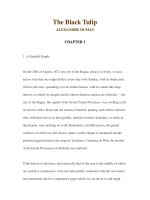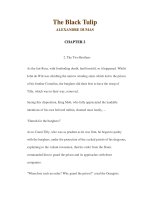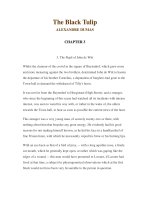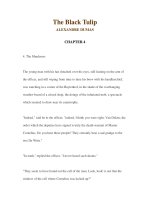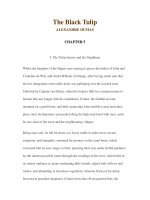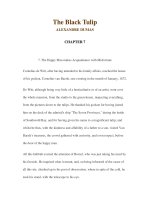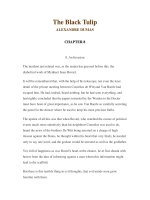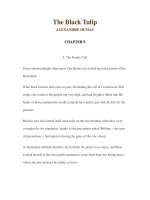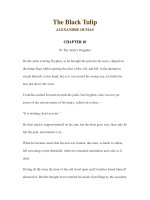LUYỆN ĐỌC TIẾNG ANH QUA CÁC TÁC PHẨM VĂN HỌC –The Black Tulip ALEXANDRE DUMAS CHAPTER 22 ppsx
Bạn đang xem bản rút gọn của tài liệu. Xem và tải ngay bản đầy đủ của tài liệu tại đây (24.08 KB, 11 trang )
The Black Tulip
ALEXANDRE DUMAS
CHAPTER 22
22. The Opening of the Flower
The night passed away very sweetly for Cornelius, although in great agitation.
Every instant he fancied he heard the gentle voice of Rosa calling him. He then
started up, went to the door, and looked through the grating, but no one was
behind it, and the lobby was empty.
Rosa, no doubt, would be watching too, but, happier than he, she watched over
the tulip; she had before her eyes that noble flower, that wonder of wonders.
which not only was unknown, but was not even thought possible until then.
What would the world say when it heard that the black tulip was found, that it
existed and that it was the prisoner Van Baerle who had found it?
How Cornelius would have spurned the offer of his liberty in exchange for his
tulip!
Day came, without any news; the tulip was not yet in flower.
The day passed as the night. Night came, and with it Rosa, joyous and cheerful
as a bird.
"Well?" asked Cornelius.
"Well, all is going on prosperously. This night, without any doubt, our tulip will
be in flower."
"And will it flower black?"
"Black as jet."
"Without a speck of any other colour."
"Without one speck."
"Good Heavens! my dear Rosa, I have been dreaming all night, in the first place
of you," (Rosa made a sign of incredulity,) "and then of what we must do."
"Well?"
"Well, and I will tell you now what I have decided on. The tulip once being in
flower, and it being quite certain that it is perfectly black, you must find a
messenger."
"If it is no more than that, I have a messenger quite ready."
"Is he safe?"
"One for whom I will answer, he is one of my lovers."
"I hope not Jacob."
"No, be quiet, it is the ferryman of Loewestein, a smart young man of twenty-
five."
"By Jove!"
"Be quiet," said Rosa, smiling, "he is still under age, as you have yourself fixed
it from twenty-six to twenty-eight."
"In fine, do you think you may rely on this young man?"
"As on myself; he would throw himself into the Waal or the Meuse if I bade
him."
"Well, Rosa, this lad may be at Haarlem in ten hours; you will give me paper
and pencil, and, perhaps better still, pen and ink, and I will write, or rather, on
second thoughts, you will, for if I did, being a poor prisoner, people might, like
your father, see a conspiracy in it. You will write to the President of the
Horticultural Society, and I am sure he will come."
"But if he tarries?"
"Well, let us suppose that he tarries one day, or even two; but it is impossible. A
tulip-fancier like him will not tarry one hour, not one minute, not one second, to
set out to see the eighth wonder of the world. But, as I said, if he tarried one or
even two days, the tulip will still be in its full splendour. The flower once being
seen by the President, and the protocol being drawn up, all is in order; you will
only keep a duplicate of the protocol, and intrust the tulip to him. Ah! if we had
been able to carry it ourselves, Rosa, it would never have left my hands but to
pass into yours; but this is a dream, which we must not entertain," continued
Cornelius with a sigh, "the eyes of strangers will see it flower to the last. And
above all, Rosa, before the President has seen it, let it not be seen by any one.
Alas! if any one saw the black tulip, it would be stolen."
"Oh!"
"Did you not tell me yourself of what you apprehended from your lover Jacob?
People will steal one guilder, why not a hundred thousand?"
"I shall watch; be quiet."
"But if it opened whilst you were here?"
"The whimsical little thing would indeed be quite capable of playing such a
trick," said Rosa.
"And if on your return you find it open?"
"Well?"
"Oh, Rosa, whenever it opens, remember that not a moment must be lost in
apprising the President."
"And in apprising you. Yes, I understand."
Rosa sighed, yet without any bitter feeling, but rather like a woman who begins
to understand a foible, and to accustom herself to it.
"I return to your tulip, Mynheer van Baerle, and as soon as it opens I will give
you news, which being done the messenger will set out immediately."
"Rosa, Rosa, I don't know to what wonder under the sun I shall compare you."
"Compare me to the black tulip, and I promise you I shall feel very much
flattered. Good night, then, till we meet again, Mynheer Cornelius."
"Oh, say 'Good night, my friend.'"
"Good night, my friend," said Rosa, a little consoled.
"Say, 'My very dear friend.'"
"Oh, my friend "
"Very dear friend, I entreat you, say 'very dear,' Rosa, very dear."
"Very dear, yes, very dear," said Rosa, with a beating heart, beyond herself with
happiness.
"And now that you have said 'very dear,' dear Rosa, say also 'most happy': say
'happier and more blessed than ever man was under the sun.' I only lack one
thing, Rosa."
"And that is?"
"Your cheek, your fresh cheek, your soft, rosy cheek. Oh, Rosa, give it me of
your own free will, and not by chance. Ah!"
The prisoner's prayer ended in a sigh of ecstasy; his lips met those of the
maiden, not by chance, nor by stratagem, but as Saint-Preux's was to meet the
lips of Julie a hundred years later.
Rosa made her escape.
Cornelius stood with his heart upon his lips, and his face glued to the wicket in
the door.
He was fairly choking with happiness and joy. He opened his window, and
gazed long, with swelling heart, at the cloudless vault of heaven, and the moon,
which shone like silver upon the two-fold stream flowing from far beyond the
hills. He filled his lungs with the pure, sweet air, while his brain dwelt upon
thoughts of happiness, and his heart overflowed with gratitude and religious
fervour.
"Oh Thou art always watching from on high, my God," he cried, half prostrate,
his glowing eyes fixed upon the stars: "forgive me that I almost doubted Thy
existence during these latter days, for Thou didst hide Thy face behind the
clouds, and wert for a moment lost to my sight, O Thou merciful God, Thou
pitying Father everlasting! But to-day, this evening, and to-night, again I see
Thee in all Thy wondrous glory in the mirror of Thy heavenly abode, and more
clearly still in the mirror of my grateful heart."
He was well again, the poor invalid; the wretched captive was free once more.
During part of the night Cornelius, with his heart full of joy and delight,
remained at his window, gazing at the stars, and listening for every sound.
Then casting a glance from time to time towards the lobby,
"Down there," he said, "is Rosa, watching like myself, and waiting from minute
to minute; down there, under Rosa's eyes, is the mysterious flower, which lives,
which expands, which opens, perhaps Rosa holds in this moment the stem of the
tulip between her delicate fingers. Touch it gently, Rosa. Perhaps she touches
with her lips its expanding chalice. Touch it cautiously, Rosa, your lips are
burning. Yes, perhaps at this moment the two objects of my dearest love caress
each other under the eye of Heaven."
At this moment, a star blazed in the southern sky, and shot through the whole
horizon, falling down, as it were, on the fortress of Loewestein.
Cornelius felt a thrill run through his frame.
"Ah!" he said, "here is Heaven sending a soul to my flower."
And as if he had guessed correctly, nearly at that very moment the prisoner
heard in the lobby a step light as that of a sylph, and the rustling of a gown, and
a well-known voice, which said to him,
"Cornelius, my friend, my very dear friend, and very happy friend, come, come
quickly."
Cornelius darted with one spring from the window to the door, his lips met
those of Rosa, who told him, with a kiss,
"It is open, it is black, here it is."
"How! here it is?" exclaimed Cornelius.
"Yes, yes, we ought indeed to run some little risk to give a great joy; here it is,
take it."
And with one hand she raised to the level of the grating a dark lantern, which
she had lit in the meanwhile, whilst with the other she held to the same height
the miraculous tulip.
Cornelius uttered a cry, and was nearly fainting.
"Oh!" muttered he, "my God, my God, Thou dost reward me for my innocence
and my captivity, as Thou hast allowed two such flowers to grow at the grated
window of my prison!"
The tulip was beautiful, splendid, magnificent; its stem was more than eighteen
inches high; it rose from out of four green leaves, which were as smooth and
straight as iron lance-heads; the whole of the flower was as black and shining as
jet.
"Rosa," said Cornelius, almost gasping, "Rosa, there is not one moment to lose
in writing the letter."
"It is written, my dearest Cornelius," said Rosa.
"Is it, indeed?"
"Whilst the tulip opened I wrote it myself, for I did not wish to lose a moment.
Here is the letter, and tell me whether you approve of it."
Cornelius took the letter, and read, in a handwriting which was much improved
even since the last little note he had received from Rosa, as follows:
"Mynheer President, The black tulip is about to open, perhaps in ten minutes.
As soon as it is open, I shall send a messenger to you, with the request that you
will come and fetch it in person from the fortress at Loewestein. I am the
daughter of the jailer, Gryphus, almost as much of a captive as the prisoners of
my father. I cannot, therefore, bring to you this wonderful flower. This is the
reason why I beg you to come and fetch it yourself.
"It is my wish that it should be called Rosa Barlaensis.
"It has opened; it is perfectly black; come, Mynheer President, come.
"I have the honour to be your humble servant,
"Rosa Gryphus.
"That's it, dear Rosa, that's it. Your letter is admirable! I could not have written
it with such beautiful simplicity. You will give to the committee all the
information that will be required of you. They will then know how the tulip has
been grown, how much care and anxiety, and how many sleepless nights, it has
cost. But for the present not a minute must be lost. The messenger! the
messenger!"
"What's the name of the President?"
"Give me the letter, I will direct it. Oh, he is very well known: it is Mynheer van
Systens, the burgomaster of Haarlem; give it to me, Rosa, give it to me."
And with a trembling hand Cornelius wrote the address,
"To Mynheer Peter van Systens, Burgomaster, and President of the Horticultural
Society of Haarlem."
"And now, Rosa, go, go," said Cornelius, "and let us implore the protection of
God, who has so kindly watched over us until now."
